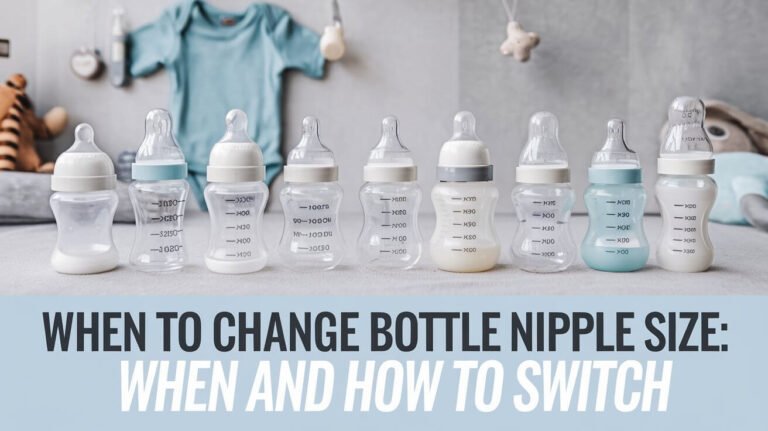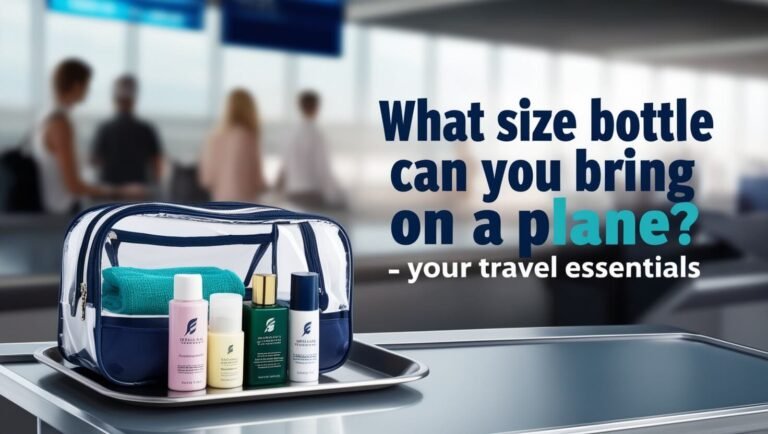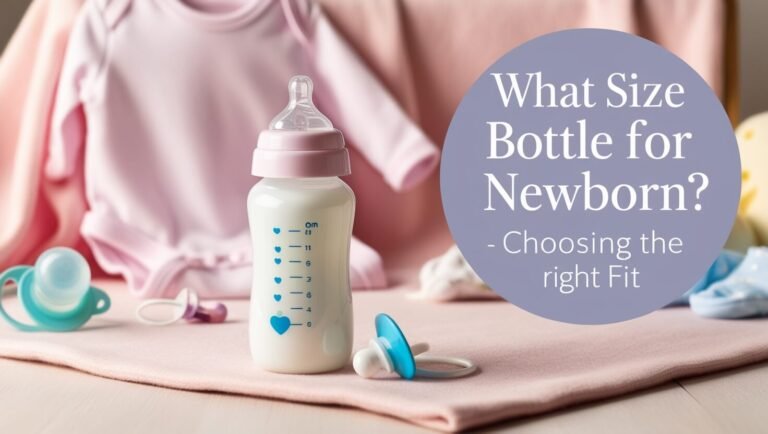What Size Bottle Can You Take on a Plane: TSA Guidelines

When packing for your next flight, you might wonder about the size of bottles you can bring. The Transportation Security Administration (TSA) has set rules to keep air travel safe and secure. Knowing these guidelines can help make your trip easier.
Let’s explore the TSA’s rules on carry-on liquids together.
TSA 3-1-1 Rule for Carry-On Liquids
Traveling with carry-on luggage can be tricky, especially with liquids, gels, and aerosols. The Transportation Security Administration (TSA) has the 3-1-1 rule to make security checks easier and safer for everyone.
Container Size Restrictions
The 3-1-1 rule says all liquids, gels, and aerosols must be in containers of 3.4 ounces or less. This includes things like toothpaste, shampoo, and lotion. These containers must fit in a quart-sized, clear plastic, zip-top bag.
Quart-Sized Bag Requirements
- Each passenger can have one quart-sized bag of liquids, gels, and aerosols.
- This bag must be taken out of your carry-on and put in a bin for X-ray screening.
- It’s a good idea to pack four or five 3.4-ounce containers in the bag.
Types of Permitted Liquids
- Alcohol less than 3.4 ounces
- Baby food and formula
- Canned foods
- Live lobsters
But, things like gel heating pads, wet foods over 3.4 ounces, ice cream, and all types of firearms can’t go in carry-on bags. Always check the TSA’s list of allowed and prohibited items before you travel. This helps make your security check smoother.
What Size Bottle Can You Take on a Plane
Understanding the rules for liquids, gels, and aerosols in carry-on bags is key. The TSA sets a limit: each person can carry containers of 3.4 ounces or less in their bags.
The 3-1-1 rule is simple. You can have a quart-sized bag of liquids, gels, and aerosols in your carry-on. This means you can pack up to four or five 3-ounce bottles in one bag. But, if you have larger items, they must go in checked luggage.
Many items fall under this rule, like shampoo, conditioner, and sunscreen. Prescription medications in solid form are allowed in unlimited amounts. Liquid, gel, and aerosol medications over 3.4 ounces are okay if they’re reasonable.
| Item | Carry-On Allowance | Checked Baggage Allowance |
|---|---|---|
| Liquids, Gels, Aerosols | 3.4 oz (100 ml) or less per container, in a 1-quart bag | No restrictions |
| Medications | Prescription meds in solid form – unlimited Liquid, gel, and aerosol meds over 3.4 oz – permitted in reasonable quantities | No restrictions |
| Baby Formula and Food | Exempt from 3-1-1 rule | No restrictions |
| Duty-Free Purchases | Permitted in carry-on if in tamper-evident bag | No restrictions |
The airport security process is in place to keep everyone safe. Following the rules helps make your travel smoother.
Special Exemptions for Liquid Restrictions
Traveling with liquids can be tricky due to strict rules. But, there are some special exceptions for travelers to know about.
Medical Liquids and Medications
Medications, both prescription and over-the-counter, don’t count towards the 3.4-ounce limit. You can carry more than 3.4 ounces of medical liquids. These don’t need to go in the quart-sized bag for security screening procedures.
Baby Formula and Child Nourishments
Infant formula, breast milk, and other baby food are also exempt. You can carry more than 3.4 ounces of these items. They don’t need to be in the quart-sized bag for travel packing.
Duty-Free Purchases
Liquids bought at duty-free shops can be taken on the plane, even if they’re over 3.4 ounces. But, they must be in a secure, tamper-evident bag. And they must be bought within 48 hours of your flight.
Even with these exceptions, these items might still get extra checks by the TSA. Be ready to show them during security screening procedures.
Security Screening Process for Liquids
At airports, checking liquids is key to keeping everyone safe. The Transportation Security Administration (TSA) has a simple rule for carry-on liquids. You can bring most liquids in containers of 3.4 ounces or less. These must all fit into a single one-quart plastic zip-top bag.
When you go through security, you’ll need to take out your quart-sized bag of liquids. Put it in a bin for X-ray screening. If a liquid alarms during screening, it will need extra checks. If it can’t be cleared, it can’t go in your carry-on.
The TSA started the 3-1-1 rule in September 2006. It was in response to a security threat in the UK. Now, many airports around the world follow this rule.
Some liquids are okay in bigger amounts. Baby formula, breast milk, medications, and special medical liquids are allowed. Frozen items and some cosmetics are also okay in larger sizes. But, you must tell security about them at the checkpoint.
Knowing the rules for liquids helps make your airport trip smoother. It also helps keep air travel safe for everyone.
International Flight Requirements for Liquids
Traveling on international flights to the U.S. means extra rules for liquids. Duty-free items over 3.4 ounces can be carried if in a special bag. This bag must be sealed and show no tampering signs.
The bag also needs to have the receipt to prove it was bought recently, usually in the last 48 hours.
Even with these special bags, airlines suggest putting liquids over 3.4 ounces in checked bags. This makes travel smoother and safer, avoiding spills or other problems.
Connecting Flight Rules
For flights connecting through international airports to the U.S., the same rules apply. Duty-free liquids in STEB bags might be okay, but always check with the airline and airport. This ensures you follow the latest rules.
Tamper-Evident Bag Regulations
The bags for duty-free liquids must meet certain standards. They should be clearly labeled, sealed, and not tampered with. Keeping the original receipt is also important.
Time Limitations for Duty-Free Items
Duty-free liquids must be bought within 48 hours to use the STEB exception. This rule helps keep the seals intact and ensures the items were recently purchased.
frequently asked questions:
What is the TSA 3-1-1 rule for carry-on liquids?
The TSA has a 3-1-1 rule for carry-on liquids. You can bring liquids, gels, and aerosols in containers of 3.4 ounces or less. These must go in a clear, quart-sized, zip-top bag.
What types of liquids are permitted under the 3-1-1 rule?
You can bring items like toothpaste, shampoo, and lotion. These must fit in a single quart-sized bag. Remember, this bag goes in a bin for X-ray screening.
How many 3.4-ounce containers can I bring in my carry-on bag?
You can have many 3.4-ounce containers. Just make sure they all fit in one quart-sized bag.
Are there any exemptions to the 3-1-1 rule?
Yes, there are exemptions. Medications, infant nourishments, and duty-free liquids are allowed. Duty-free items must be in tamper-evident bags and bought within 48 hours.
What happens during the security screening process for liquids?
Liquids must be in a quart-sized bag for screening. If something alarms, it will need extra checks. Items that can’t be screened can’t go in carry-ons.
What are the requirements for international flights connecting to the U.S.?
For flights to the U.S., duty-free liquids over 3.4 ounces are okay. They must be in tamper-evident bags. Keep all liquids over 3.4 ounces in checked bags, even in tamper-evident bags.




